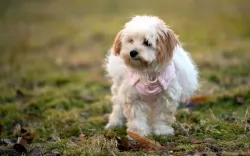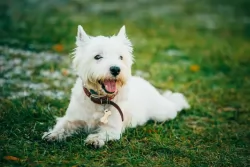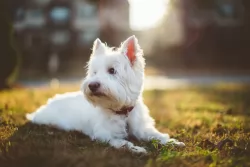 MyDogBreeds
MyDogBreeds Dutch Shepherd is originated from Netherlands but West Highland White Terrier is originated from United Kingdom. Dutch Shepherd may grow 32 cm / 13 inches higher than West Highland White Terrier. Dutch Shepherd may weigh 22 kg / 49 pounds more than West Highland White Terrier. Both Dutch Shepherd and West Highland White Terrier has almost same life span. Dutch Shepherd may have more litter size than West Highland White Terrier. Dutch Shepherd requires Moderate maintenance. But West Highland White Terrier requires High maintenance
Dutch Shepherd is originated from Netherlands but West Highland White Terrier is originated from United Kingdom. Dutch Shepherd may grow 32 cm / 13 inches higher than West Highland White Terrier. Dutch Shepherd may weigh 22 kg / 49 pounds more than West Highland White Terrier. Both Dutch Shepherd and West Highland White Terrier has almost same life span. Dutch Shepherd may have more litter size than West Highland White Terrier. Dutch Shepherd requires Moderate maintenance. But West Highland White Terrier requires High maintenance
 The Dutch Shepherd is of Dutch origin, hailing from the Netherlands. They were originally used as herding dogs on the farms, where they became a jack-of-all-trades type of dog.
The Dutch Shepherd is of Dutch origin, hailing from the Netherlands. They were originally used as herding dogs on the farms, where they became a jack-of-all-trades type of dog.
The Dutch Shepherd in those days, 100 odd years ago, were also known as Hollandse Herders.
These dogs are more rare in modern days, but when you do find them, they are being used as police or security dogs, as guides for the blind, or simply as family friends.
 The West highland white terrier originated from Poltalloch in Scotland. So they were initially called as Poltalloch terrier and after that they were called as Roseneath terrier. They were initially used for hunting fox, badger, otter and in killing the vermin like rats.
The West highland white terrier originated from Poltalloch in Scotland. So they were initially called as Poltalloch terrier and after that they were called as Roseneath terrier. They were initially used for hunting fox, badger, otter and in killing the vermin like rats.
The breed history says that Colonel Malcolm of Poltalloch was the reason for the Westie's white colour. This is because in 19th centuryhe went for hunting with his dogs and accidentally he shot his dog as its colour was as fox. So he decided to breed only white colour dogs.
 The Dutch Shepherd dog is very similar in appearance to the popular German Shepherds, being a medium to large sized dog.
The Dutch Shepherd dog is very similar in appearance to the popular German Shepherds, being a medium to large sized dog.
The males are slightly heavier than females, but both males and females can stand between 55 and 62cm and weigh between 20 and 32kg.
There are actually 3 varieties found in the Dutch Shepherd dogs - short-haired, long-haired, and wiry or rough-haired. The dog has a double coat, consisting of a woolly undercoat and a top coat. The basic color of the coat is gold or silver through to red, giving rise to the brindle variations. Too much black or white seen in the fur is considered a fault.
In 1914 it was decided that brindle coats would distinguish them from the others.
The eyes of the Dutch Shepherd are dark, almond shaped and slightly slanting, while the medium sized ears are erect and high on the head and the thick tail is slightly curved. The dog has an unusually long tongue which is often found hanging out.
Early training and socializing for this dog is important so that he can learn to stay calm around new people, or visitors to the property.
The beautiful Dutch Shepherd doesn’t like being left alone for too long, loving rather to be involved with all that the family is involved in. They get on well with other pets in the home as well as being child-friendly.
They are happy dogs, who can also be smart and cunning, therefore highly trainable. They soak up new commands easily. Dutch Shepherds are also good watchdogs as they are fiercely loyal, and do not take kindly to strangers.
 The Westie can be said as that a small dog having the talents of the big dog. They are very popular for their obedience. They are also working as therapy dogs and also some in search and rescue teams. The home having Westie will have fun always and be enthusiastic. They will suit them for country or city living, but they like to live with their family. They are well suitable for apartment living, but some training should be given to them for not barking. They can stay in home when you are at work. Westie can be taken to travel, whether it may be long vacation or a short visit.
The Westie can be said as that a small dog having the talents of the big dog. They are very popular for their obedience. They are also working as therapy dogs and also some in search and rescue teams. The home having Westie will have fun always and be enthusiastic. They will suit them for country or city living, but they like to live with their family. They are well suitable for apartment living, but some training should be given to them for not barking. They can stay in home when you are at work. Westie can be taken to travel, whether it may be long vacation or a short visit.
They are quick learners and so training them is not difficult. Mistakes of them can be corrected patiently since they don't like harsh activities against them. Westie will definitely bark when he sees something or hear different sounds. He will bark on seeing visitors or even other dogs. Sometimes they will bark for very silly things but when given appropriate training in their young stage, they can bark only for alerts.
 Your alert, intelligent and somewhat rare Dutch Shepherd is a loyal, protective dog, and while he can be aggressive around intruders and be a great guard dog, he can also be a gentle, loving animal around his human family members.
Your alert, intelligent and somewhat rare Dutch Shepherd is a loyal, protective dog, and while he can be aggressive around intruders and be a great guard dog, he can also be a gentle, loving animal around his human family members.
Though his tongue is long and often hangs out, you won’t have to contend with drooling. He is a wonderfully active dog and doesn’t easily gain weight. He isn’t a barker or howler, and his exceptional intelligence makes him highly trainable.
Whether there are children or other animals in the house, you can rely on your Dutch Shepherd to get on well with them, making him a wonderful family pet and canine friend.
 The Westie is friendly with children but not all the time. So some care should be taken while they are near children.
The Westie is friendly with children but not all the time. So some care should be taken while they are near children.
They like to chase rodents like rabbits as they are interested in hunting.
They are suitable for apartment living unless they are left alone for a very long time. They love cold weather more than hot.
They can be trained by giving some extra efforts.
 The Dutch Shepherd dogs are the healthiest of the Shepherd breeds. They have relatively few health problems.
The Dutch Shepherd dogs are the healthiest of the Shepherd breeds. They have relatively few health problems.
However, like the German Shepherds they may develop hip dysplasia, but this is in fact fairly rare. Get your pet to the vet if you suspect this in your dog because it can lead to lameness.
In 2018 the University of Minnesota identified a disease in Dutch Shepherds called Miositis. This is an inflammatory myopathy causing painful inflammation of the skeletal muscle tissue.
 Itchy skin and pyoderma are common in terriers. Skin diseases such as Seborrhea and epidermal dysplasia are also found in them.
Itchy skin and pyoderma are common in terriers. Skin diseases such as Seborrhea and epidermal dysplasia are also found in them.
Westies have possibilities of getting yeast infections in skin[Malassezia Dermatitis] and due to that hair loss will be more.
 Unfortunately Dutch Shepherds shed quite a bit of hair during their shedding period in spring and autumn. This makes regular brushing important during these seasons so as to remove the dead hairs, especially from the undercoat.
Unfortunately Dutch Shepherds shed quite a bit of hair during their shedding period in spring and autumn. This makes regular brushing important during these seasons so as to remove the dead hairs, especially from the undercoat.
The wire- or rough-haired variety shouldn’t be brushed but should rather be groomed by a professional groomer every 6 months or so.
Their nails need to be trimmed when necessary, to avoid cracking, splitting, or an injury.
Their ears can be cleaned weekly to get rid of any debris or wax build-up. This, if left, can lead to infection. Brush his teeth 2 or 3 times a week to avoid dental disease which brings on a host of illnesses.
These dogs do need regular exercising, and at the same time need to be physically and mentally stimulated. He is the kind of dog that has been used for herding purpose on the farm and he just craves activity. Take him with you on your walks and include him in ball games, hikes, jogging, swimming or when you go cycling – he is game for all kinds of activities.
The formula for their diet would be that of a medium to large dog with high energy levels. The top commercially manufactured foods have been developed to include all the important vitamins and minerals. Fish oil can also be added to their food to keep the coat shiny.
Add in cooked rice, cooked vegetables and chicken from time to time and be sure to add in some raw meat occasionally to prevent problems with the skin. Always ensure that your pet has fresh, cool water to drink.
 The puppy should be fed 3 to 4 times per day as it requires a considerable amount for their growth. Cooked chicken breast and turkey are best for them and also vegetables should be given to them. Beef and chicken should be kept a limit as it will lead to itchy skin and allergies.
The puppy should be fed 3 to 4 times per day as it requires a considerable amount for their growth. Cooked chicken breast and turkey are best for them and also vegetables should be given to them. Beef and chicken should be kept a limit as it will lead to itchy skin and allergies.
The preferable food for the Westie is home cooked. The home food will only contain all the essential nutrients for the Westie.
Eventhough the Westie is suitable for apartment living it is recommended to have a daily walk for him to be active and refreshing.
They should be made to play for atleast 30 minutes per day for their health as to not gain overweight. Grown up children can play with them as they like it.